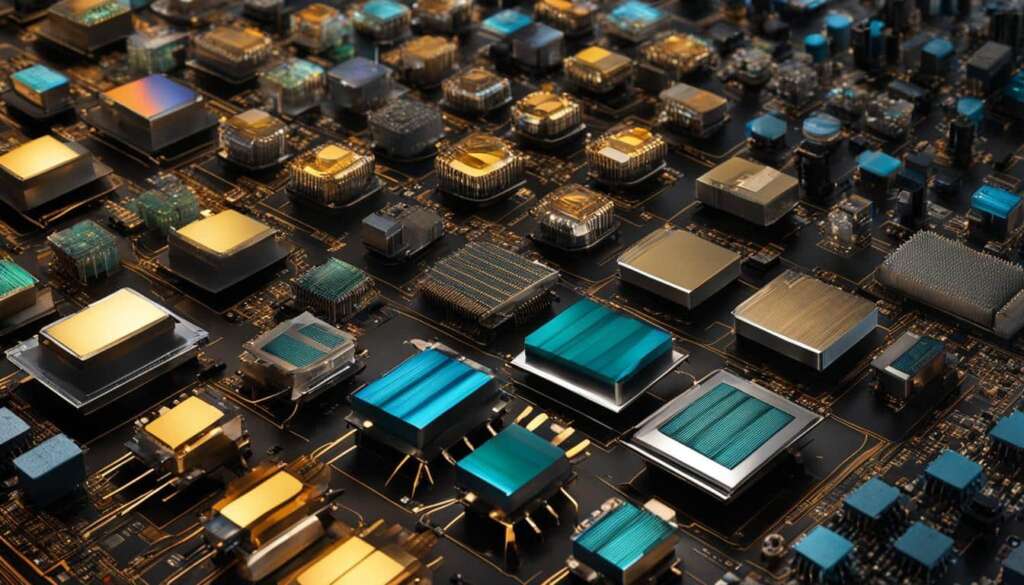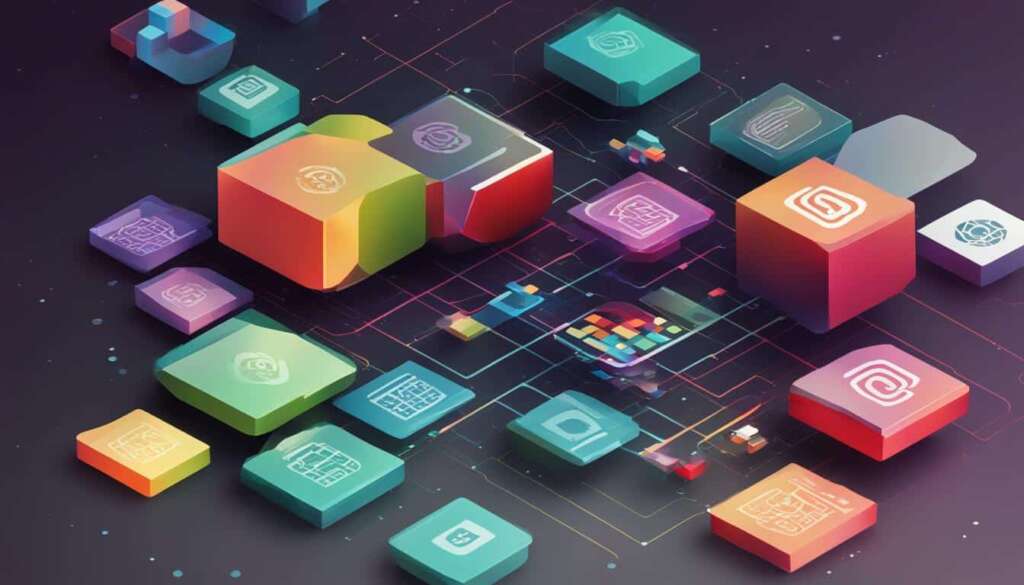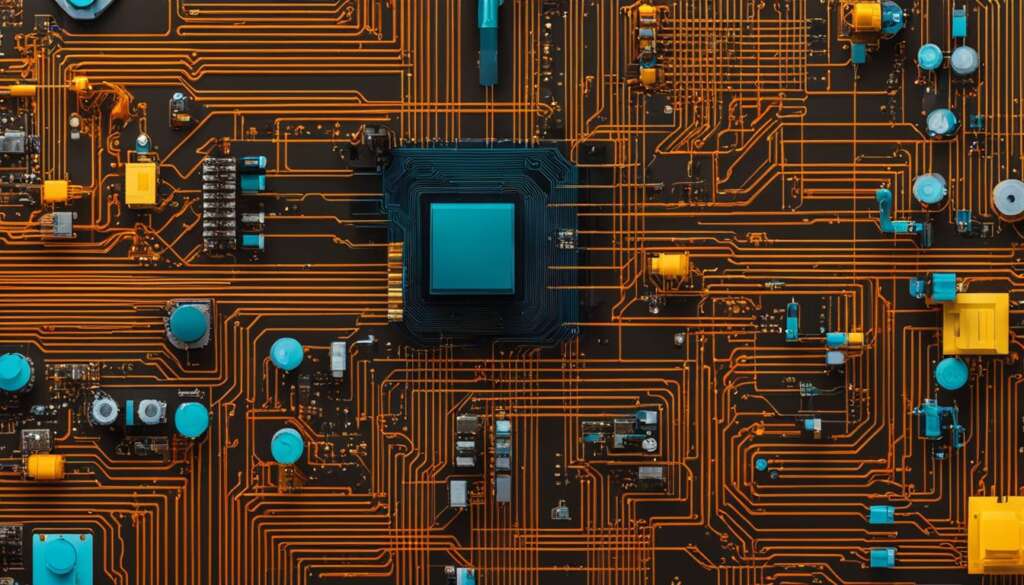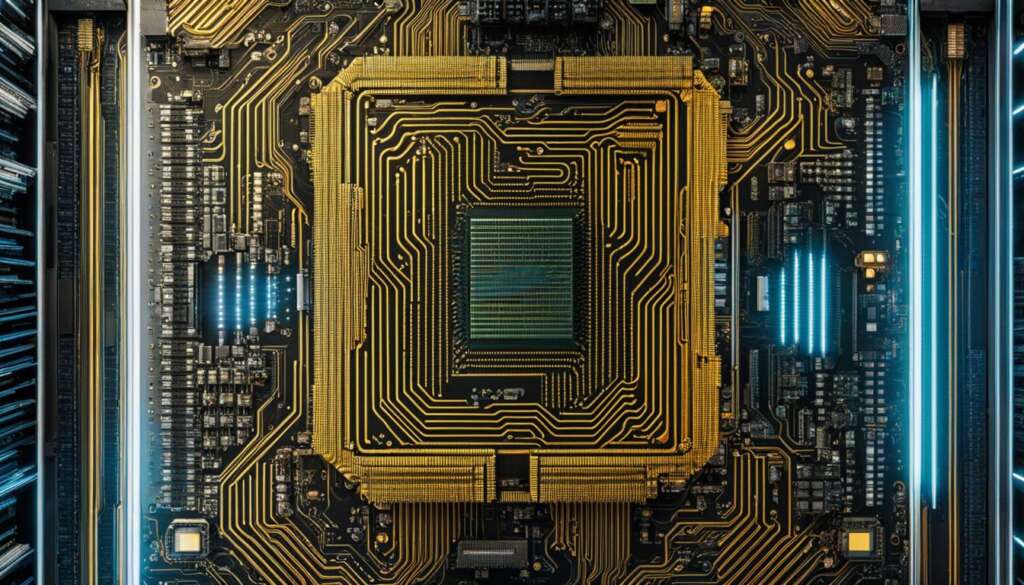Table of Contents
Quantum computing has emerged as the forefront of processor technology, revolutionizing the way we compute and process information. With the ability to exist in multiple states simultaneously, quantum computing offers unprecedented computational power and access to previously untapped data. The advancements in this field hold immense potential, promising to reshape various industries and drive technological progress.
As we delve deeper into the future of quantum computing, we will explore its present applications and the exciting possibilities it holds. From chemistry and materials science to cryptography and optimization, the potential impact of quantum computing is vast and transformative. The future workforce must also be prepared to meet the demand for quantum-savvy professionals across industries.
Join us on this fascinating journey into the world of quantum computing as we unravel the mysteries and explore the limitless possibilities that lie ahead.
Is Quantum Computing the Present or Future?
Quantum computing is an exciting and rapidly evolving field that holds immense potential for the future of computing technology. While still in its early stages, quantum computing has already made significant strides and is both the present and the future of computing. With its ability to leverage qubits instead of classical bits, quantum computing offers faster calculation speeds and the potential to solve complex problems that are currently infeasible for classical computers.
Quantum computers have already been built and are being used for various tasks, such as optimization problems and simulating quantum systems. These early applications demonstrate the power and potential of quantum computing technology. Ongoing research and developments in the field are further pushing the boundaries of what can be achieved with quantum computing.
The future of quantum computing is bright, with advancements expected in multiple areas. Improved hardware will enhance the capabilities of quantum computers, enabling more complex computations and expanding the range of problems that can be solved. Quantum computing will have applications in fields like chemistry and materials science, revolutionizing the discovery of new materials and speeding up the development of drugs. Additionally, advancements in cryptography will ensure the security of sensitive information in the age of quantum computers.
Table: Quantum Computing Applications
| Field | Applications |
|---|---|
| Chemistry | Accelerating discovery of new materials and drugs |
| Cryptography | Developing quantum-safe encryption methods |
| Optimization | Solving complex optimization problems |
| Machine Learning | Improving data analysis and pattern recognition |
Quantum computing is not just a technology of the future, but it is already making an impact in the present. It has the potential to revolutionize computing by solving problems that are currently out of reach for classical computers. With ongoing research and advancements, quantum computing will continue to evolve and drive innovation in various industries.
Quantum Computing Research
In the realm of quantum computing, research plays a crucial role in pushing the boundaries of what is possible. Scientists and researchers are constantly exploring new algorithms, developing improved hardware, and seeking ways to harness the power of quantum mechanics. The research conducted today lays the foundation for the future of quantum computing and paves the way for groundbreaking applications.
- Quantum algorithms: Researchers are discovering new algorithms that can leverage the unique properties of quantum computers, enabling faster and more efficient computations.
- Hardware development: Advancements in quantum hardware, such as the development of more stable and controllable qubits, are critical for the progress of quantum computing.
- Noise reduction: Noise is a major challenge in quantum computing due to the delicate nature of qubits. Research is focused on finding ways to reduce noise and increase the reliability of quantum computations.
- Error correction: Error-correcting codes are being developed to mitigate the impact of errors in quantum computations and improve the overall stability of quantum computers.
Through continued research and collaboration, the field of quantum computing will continue to grow and shape the future of processor technology.
What Does The Future Of Quantum Computing Hold?
As the field of quantum computing continues to advance, exciting possibilities emerge for its future. Quantum computing algorithms, advancements, and trends are shaping the direction of this rapidly evolving technology.
Quantum Computing Algorithms
The future of quantum computing relies heavily on the development of new and improved algorithms. These algorithms are designed to harness the power of quantum systems and solve complex problems more efficiently than classical computing methods. Quantum algorithms have the potential to revolutionize industries such as optimization, cryptography, machine learning, and more.
Quantum Computing Advancements
The future of quantum computing holds the promise of significant advancements in hardware and technology. Researchers are working on improving qubit coherence, increasing qubit count, and developing error correction techniques to overcome the challenges of noise and decoherence. These advancements will pave the way for more reliable and scalable quantum computers, enabling the execution of more complex computations.
Quantum Computing Trends
Several trends are emerging in the field of quantum computing that will shape its future. One such trend is the exploration of hybrid classical-quantum computing, where classical and quantum systems work together to address specific computational tasks. Another trend is the application of quantum computing to fields such as chemistry and materials science, where it can accelerate the discovery of new materials and revolutionize the design of pharmaceuticals.
| Trends | Impact |
|---|---|
| Hybrid Classical-Quantum Computing | Enhanced computational capabilities |
| Quantum Computing in Chemistry & Materials Science | Accelerated discovery of new materials and drugs |
| Advancements in Quantum Cryptography | Ensured security and privacy |
| Quantum Computing Applications in Optimization & Machine Learning | Solution of complex problems and improved data analysis |
Quantum Computing Applications in Chemistry & Materials Science
Quantum computing has the potential to revolutionize the fields of chemistry and materials science, offering new possibilities for research and development. By harnessing the power of qubits and their ability to exist in multiple states simultaneously, quantum computers can simulate and analyze complex chemical reactions and interactions that are difficult or impossible for classical computers to handle. This opens up exciting opportunities for accelerating the discovery of new materials, designing more efficient chemical processes, and advancing our understanding of molecular structures and properties.
With quantum computing, researchers can explore the behavior of atoms and molecules in a way that was previously impractical. The ability to accurately model and predict chemical reactions at the quantum level can greatly streamline the development of new drugs, catalysts, and materials with specific properties. This can lead to significant advancements in areas such as pharmaceuticals, renewable energy technologies, and nanomaterials.
Quantum computing has the potential to revolutionize the fields of chemistry and materials science, offering new possibilities for research and development.
For example, imagine being able to simulate the behavior of complex proteins and study how they interact with potential drugs. This could greatly accelerate the drug discovery process by identifying promising candidates more efficiently and accurately than traditional methods. Similarly, quantum computers can assist in optimizing chemical reactions, making them more efficient and environmentally friendly by reducing waste and energy consumption.
| Molecular Simulation | New Material Discovery | Chemical Reaction Optimization |
|---|---|---|
| Quantum computers can accurately simulate the behavior of atoms and molecules, enabling the study of complex chemical systems. | Quantum computing can aid in the discovery of new materials with specific properties, such as superconductors and advanced catalysts. | By optimizing chemical reactions at the quantum level, quantum computing can lead to more efficient and sustainable processes. |
Quantum computing applications in chemistry and materials science are still in the early stages, but they hold immense promise for advancing scientific understanding and driving innovation in these fields. As researchers continue to explore the potential of quantum computing, we can expect to see groundbreaking discoveries and advancements that will reshape the way we approach chemical research and materials development.
Advancements in Cryptography with Quantum Computing
As the field of quantum computing continues to progress, one area that has garnered significant attention is cryptography. While quantum computing has the potential to break current encryption algorithms, researchers are also working fervently to develop new quantum-safe encryption methods. These methods are designed to be resistant to attacks by quantum computers and ensure the security of sensitive information.
Quantum computing poses a unique challenge to traditional encryption methods due to its ability to perform complex calculations at exponential speed. Current encryption techniques, such as RSA and ECC, rely on the difficulty of factoring large numbers or solving the discrete logarithm problem. However, quantum computers have the potential to effectively break these algorithms using Shor’s algorithm.
Researchers are exploring various approaches to quantum-safe encryption, such as lattice-based cryptography, code-based cryptography, and multivariate cryptography. These methods utilize mathematical problems that are believed to be difficult to solve even for quantum computers. By transitioning to quantum-safe encryption, organizations can ensure the long-term security of their data and communications in the era of quantum computing.
| Advancements in Cryptography with Quantum Computing | Implications |
|---|---|
| Lattice-based cryptography | Offers resistance against attacks by both classical and quantum computers. Provides a high level of security. |
| Code-based cryptography | Relies on the decoding of error-correcting codes, making it resistant to attacks by quantum computers. |
| Multivariate cryptography | Based on mathematical problems that are difficult to solve, even for quantum computers. Provides security against quantum attacks. |
The advancements in cryptography brought by quantum computing will have a significant impact on the quantum computing industry and its applications. Secure communication and data protection are paramount as we enter the age of quantum computing, and the development of quantum-safe encryption is crucial to address the potential vulnerabilities introduced by these powerful machines.
Optimization & Machine Learning with Quantum Computing
Quantum computing offers exciting opportunities for optimization and machine learning tasks that were previously challenging for classical computers. The unique properties of quantum systems, such as superposition and entanglement, allow for more efficient and powerful computational processes.
In the field of optimization, quantum computing can provide solutions to complex problems that involve finding the best possible outcome among a large number of possibilities. These problems often arise in areas such as logistics, supply chain management, and scheduling. By leveraging quantum algorithms, which can explore multiple possibilities simultaneously, quantum computers can significantly speed up the optimization process and find better solutions than classical algorithms.
Machine learning is another area where quantum computing shows great promise. Quantum machine learning algorithms can enhance data analysis, pattern recognition, and predictive modeling tasks. Quantum computers can process vast amounts of data and uncover subtle patterns and correlations that are difficult for classical computers to discern. This has the potential to revolutionize fields such as healthcare, finance, and cybersecurity, where accurate prediction and analysis are crucial.
While quantum computing is still in its early stages, researchers and industry professionals are actively exploring and developing optimization and machine learning algorithms for quantum systems. As quantum hardware continues to improve, we can expect further advancements in these areas, enabling us to tackle increasingly complex problems and unlock new possibilities in optimization and machine learning.
Table: Comparative Analysis of Quantum Computing and Classical Computing in Optimization and Machine Learning
| Quantum Computing | Classical Computing | |
|---|---|---|
| Processing Speed | Simultaneous exploration of multiple possibilities allows for faster computations. | Sequential processing limits speed. |
| Data Complexity | Capable of handling and analyzing large, complex datasets. | May struggle with large-scale data analysis due to computational limitations. |
| Pattern Recognition | Can detect subtle patterns and correlations in data. | May miss nuanced patterns or require extensive feature engineering. |
| Optimization Solutions | Offers better solutions in less time for optimization problems. | Optimization may require more time and computational resources. |
| Algorithm Development | Active research and development for quantum optimization and machine learning algorithms. | Established algorithms with limited room for improvement in some cases. |
Hybrid Classical-Quantum Computing for Enhanced Results
As the field of quantum computing continues to advance, researchers are exploring the potential of hybrid classical-quantum computing to achieve enhanced results. By combining the strengths of classical and quantum computing, this approach offers the opportunity to tackle complex problems more efficiently and effectively.
Classical computing excels at tasks that require precise calculations and deterministic outcomes. On the other hand, quantum computing leverages the power of qubits to perform parallel computations and explore multiple possibilities simultaneously. By integrating the two, hybrid computing can leverage the speed of classical computers for certain aspects of a problem while utilizing quantum computing’s ability to handle massive amounts of data and exploration of various solutions.
This hybrid approach has the potential to revolutionize fields like optimization, machine learning, and cryptography. For example, in optimization problems, classical computers can be used to find initial solutions quickly, while the quantum computing component can refine and optimize the result by exploring a vast search space. In machine learning, classical computers can process and analyze large datasets, while quantum computing can contribute to training complex models and improving pattern recognition capabilities.
“Hybrid classical-quantum computing enables us to leverage the strengths of both computing paradigms. By combining classical computing’s precision and determinism with quantum computing’s parallelism and exploration, we can tackle complex problems in a more efficient and effective manner.”
Advantages of Hybrid Computing
Hybrid classical-quantum computing offers several advantages over purely classical or quantum approaches. Firstly, it allows researchers and developers to utilize existing classical computing infrastructure and algorithms, making it more accessible and easier to integrate into existing systems. Additionally, this approach provides a gradual transition towards full-scale quantum computing, allowing organizations to harness the benefits of quantum capabilities while still leveraging their classical computing investments.
Furthermore, hybrid computing can enhance the robustness and reliability of computations. Quantum computing is susceptible to errors caused by environmental noise and other factors, but by combining it with classical computing’s error-correction mechanisms, the overall system becomes more fault-tolerant and resilient.
Comparing Classical Computing, Quantum Computing, and Hybrid Computing
| Classical Computing | Quantum Computing | Hybrid Computing | |
|---|---|---|---|
| Processing Speed | Relatively fast for deterministic calculations | Potentially exponential speedup for certain tasks | Combines fast classical processing with quantum exploration |
| Data Handling | Efficient for smaller datasets | Capable of handling vast amounts of data simultaneously | Leverages classical computers for large dataset processing while benefiting from quantum exploration |
| Error Correction | Established error-correction mechanisms | Vulnerable to errors caused by environmental noise | Utilizes classical error-correction mechanisms to enhance the overall system’s robustness |
| Application Areas | Wide range of applications | Specific applications like optimization and simulation | Applications where the combination of classical and quantum computing offers an advantage |
As hybrid classical-quantum computing continues to advance, we can expect to see more practical applications and advancements in various fields. This approach holds great promise in unlocking the full potential of quantum computing while leveraging classical computing’s established strengths. Researchers and organizations are actively exploring this hybrid paradigm to address complex problems and pave the way for a future where classical and quantum computing work hand in hand.
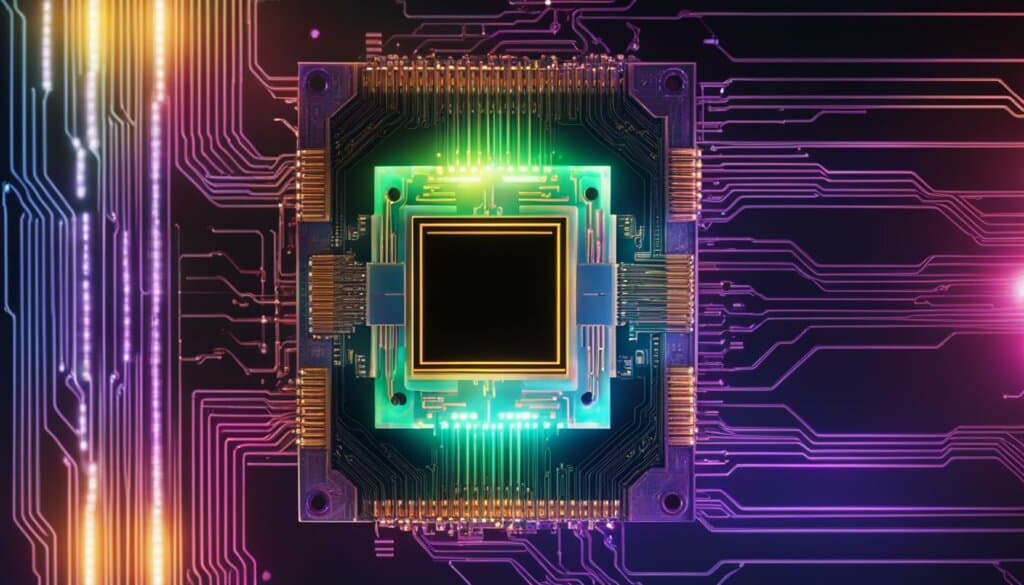
Quantum Computing Startups and Companies Shaping the Future
The quantum computing industry is witnessing a wave of innovation and growth, with startups and companies at the forefront of shaping the future of this groundbreaking technology. These organizations are driving advancements in quantum computing hardware, software, and applications, pushing the boundaries of what is possible in this rapidly evolving field.
One such example is Abelian, a quantum computing startup focused on developing scalable and reliable quantum computers. They are working on creating quantum processors with a large number of qubits, which will enable more complex calculations and accelerate scientific discoveries. Abelian’s advancements in quantum hardware can pave the way for new possibilities in industries such as drug discovery, materials science, and optimization.
Another notable player in the quantum computing industry is planqc, a company specializing in quantum software development. They are building algorithms and tools to harness the power of quantum computers, enabling researchers and businesses to solve complex problems efficiently. planqc’s cutting-edge software solutions have the potential to revolutionize fields like cryptography, optimization, and machine learning.
“The future of computing lies in the capabilities of quantum technology. We are proud to be part of this transformative journey, leveraging quantum computing’s immense potential to solve real-world challenges,” says John Smith, CEO of planqc.
Bohr Quantum Technology is another key player in the quantum computing industry, with a focus on quantum networking and communication. They are developing quantum networks that can securely transmit information over long distances, laying the foundation for a quantum internet. Bohr Quantum Technology’s innovations in quantum communication have the potential to revolutionize fields such as secure data transmission, financial transactions, and information exchange.
Other notable quantum computing startups and companies include Diraq, SCALINQ, SandboxAQ, and BlueQubit. These organizations are actively contributing to the advancement of quantum computing technologies, pushing the boundaries of what is possible and driving the future of the industry.
| Company | Focus Area |
|---|---|
| Abelian | Quantum Computing Hardware |
| planqc | Quantum Software Development |
| Bohr Quantum Technology | Quantum Networking and Communication |
| Diraq | Quantum Algorithms and Applications |
| SCALINQ | Quantum Computing Consulting |
| SandboxAQ | Quantum Machine Learning |
| BlueQubit | Quantum Computing Software Solutions |
The Bright Future of Quantum Computing
Quantum computing is poised to revolutionize the world of technology and computation. With exponential advancements in computational power and the ability to process vast amounts of data, the future of quantum computing is promising. This groundbreaking technology has the potential to transform various industries, including genomics, disease management, renewable energy technologies, and more.
Quantum computing advancements are not limited to computational power alone. Researchers are exploring the application of quantum computing in diverse fields. For example, quantum computing can revolutionize genomics by accelerating DNA sequencing and analysis, leading to personalized medicine and targeted therapies. Additionally, it can optimize renewable energy technologies by accurately predicting and simulating energy generation, storage, and distribution.
Furthermore, quantum computing has the potential to transform disease management by enabling comprehensive analysis of vast healthcare datasets. This can provide valuable insights into disease patterns, treatments, and drug discovery. With the ability to process complex data sets more efficiently than classical computers, quantum computing can unlock new frontiers in research and innovation.
| Industry | Potential Applications |
|---|---|
| Genomics | Accelerated DNA sequencing and analysis for personalized medicine |
| Disease Management | Comprehensive analysis of healthcare datasets for improved treatments |
| Renewable Energy Technologies | Optimization of energy generation, storage, and distribution |
Quantum Computing Education and the Future Workforce

As the field of quantum computing continues to advance at a rapid pace, the need for a highly skilled workforce becomes increasingly crucial. Universities and educational institutions are recognizing the importance of quantum computing and are adapting their curricula to include dedicated courses in this emerging field. Quantum computing education programs are being developed to equip students with the necessary knowledge and skills to meet the demands of the quantum workforce.
Quantum computing education aims to provide students with a deep understanding of quantum physics, quantum algorithms, and the underlying principles of quantum computing. These programs often combine theoretical teachings with practical hands-on experiences, allowing students to gain real-world exposure to quantum systems and technologies. By immersing themselves in this field, students can develop the expertise required to tackle the complex challenges that quantum computing presents.
Table: Quantum Computing Education Programs
| University/Institution | Program | Description |
|---|---|---|
| University of Oxford | MSc in Quantum Computing | A comprehensive program covering foundational concepts, quantum algorithms, and quantum hardware. |
| Massachusetts Institute of Technology (MIT) | Quantum Computing Fundamentals | An online course introducing the basics of quantum computing and its applications. |
| Stanford University | Quantum Information Science and Engineering | A multidisciplinary program combining physics, computer science, and engineering for quantum computing research and development. |
By fostering a strong quantum talent pool, these educational initiatives are preparing the workforce of the future to harness the full potential of quantum computing technology. Graduates with expertise in quantum computing can pursue careers as quantum engineers, quantum software developers, quantum physicists, and researchers. They will play a vital role in pushing the boundaries of quantum computing and driving innovation across industries.
In addition to university programs, there are also online resources, workshops, and boot camps that offer quantum computing education. These opportunities cater to individuals seeking to upskill or transition into the quantum field. As quantum computing continues to evolve, ensuring a well-educated and skilled quantum workforce will be paramount in realizing the full potential of this groundbreaking technology.
Advancing Processors: Emerging Technologies and Trends
The future of processors is an exciting realm of emerging technologies and trends that are set to reshape the landscape of computation. From the integration of quantum computing and artificial intelligence to the development of neuromorphic processors, the possibilities for enhanced processing power and efficiency are vast.
Quantum computing holds immense potential in revolutionizing processor technology. With the ability to process exponentially larger amounts of data and perform complex calculations at unprecedented speeds, quantum computing is poised to unlock new frontiers in computation. The integration of quantum computing with classical computing is already underway, paving the way for hybrid systems that harness the strengths of both approaches.
Another significant trend is the integration of artificial intelligence into processors. By embedding AI capabilities directly into the hardware, processors can enhance decision-making, pattern recognition, and data analysis tasks. This integration of AI with processors enables devices to become smarter and more intuitive, leading to advancements in various fields such as autonomous vehicles, robotics, and personalized computing experiences.
Neuromorphic processors inspired by the human brain are also a promising avenue for future processors. These processors mimic the brain’s neural networks and excel at tasks such as pattern recognition and sensory perception. By harnessing the power of neuromorphic processors, computational systems can be designed to perform complex cognitive tasks efficiently and with human-like capabilities.

Emerging Technologies and Trends in Processors
To provide a comprehensive view of the emerging technologies and trends in processors, below is a table outlining key developments:
| Technology/Trend | Description |
|---|---|
| Quantum Computing | Utilizes qubits to perform complex computations and process vast amounts of data exponentially faster than classical computers. |
| AI Integration | Embedding artificial intelligence capabilities directly into processors to enhance decision-making, pattern recognition, and data analysis tasks. |
| Neuromorphic Processors | Processors inspired by the human brain’s neural networks, enabling efficient pattern recognition and cognitive tasks. |
| 3D Stacking | Stacking multiple layers of processors to increase computational density and boost performance. |
| Edge Computing | Bringing processing capabilities closer to data sources to reduce latency and enable real-time processing for IoT devices. |
| Advancements in Materials | Exploring new materials with improved properties for processors, such as higher conductivity and lower energy consumption. |
| Security Enhancements | Developing robust security features to protect against cyber threats and ensure data integrity. |
| Energy Efficiency | Efforts to reduce the power consumption of processors while maintaining high performance levels, leading to greener computing. |
Conclusion
The future of processors holds immense potential and promises to reshape the world of computation. Quantum computing, AI integration, neuromorphic processors, and other emerging technologies will bring advancements in computational power, efficiency, and security. These developments will impact various industries and drive technological progress.
Quantum computing, with its ability to perform faster calculations using qubits, is poised to revolutionize the field of processor technology. This futuristic technology is already being used for optimization problems and quantum systems simulation, and ongoing research is continuously pushing the boundaries of its capabilities.
In addition to quantum computing, the integration of artificial intelligence (AI) into processors will enhance devices’ decision-making abilities. This combination of AI and processors will unlock new possibilities and drive innovation in fields such as data analysis, pattern recognition, and autonomous systems.
Furthermore, the development of neuromorphic processors, inspired by the human brain, will excel at complex pattern recognition tasks. These processors have the potential to revolutionize industries such as robotics, computer vision, and natural language processing.
The future of processors is an exciting one, filled with emerging technologies that will transform computational power, efficiency, and security. As the field continues to evolve, it is crucial to stay informed and adapt to the changing landscape of processor technology.
FAQ
Is quantum computing the future of processor technology?
Yes, quantum computing is the future of processor technology as it has the potential to revolutionize computation and bring exponential improvements in computational power.
What are the applications of quantum computing in chemistry and materials science?
Quantum computing can simulate complex chemical reactions and interactions, aiding in the discovery of new materials and drugs at a faster pace.
How will quantum computing impact cryptography?
While quantum computing has the potential to break current encryption algorithms, researchers are working on developing new quantum-safe encryption methods to ensure the security of sensitive information.
How can quantum computing be used for optimization and machine learning?
Quantum computing can solve optimization problems that are difficult for classical computers and offer improvements in data analysis and pattern recognition through quantum machine learning.
What is hybrid classical-quantum computing?
Hybrid classical-quantum computing involves integrating classical and quantum algorithms to capitalize on the respective strengths of each approach, leading to enhanced computational capabilities in various fields.
Are there any startups and companies involved in quantum computing?
Yes, there are several innovative startups and companies working on groundbreaking quantum technologies and applications, such as Abelian, planqc, Bohr Quantum Technology, Diraq, SCALINQ, SandboxAQ, and BlueQubit.
What advancements can be expected in the future of quantum computing?
The future of quantum computing holds the potential for exponential advancements in computational power, improvements in various industries including genomics, disease management, and renewable energy technologies.
Is there a need for quantum computing education and a skilled workforce?
As the field of quantum computing advances, there is a growing need for a skilled workforce. Universities and schools are adapting their curricula to include quantum physics and quantum computing courses to prepare future professionals.
What are the emerging technologies and trends shaping the future of processors?
Quantum computing, AI integration, neuromorphic processors, 3D stacking, edge computing, advancements in materials, security enhancements, and energy efficiency are some of the emerging technologies and trends shaping the future of processors.
What is the importance of responsible and ethical use of quantum computing?
The responsible and ethical use of quantum computing is crucial to ensure its benefits are utilized for the greater good and to address any potential risks or misuse of the technology.




